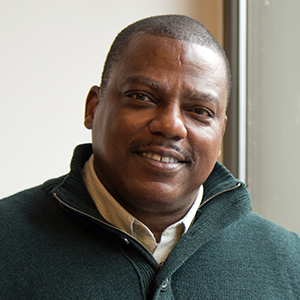Joe Johnson, Diversity Coordinator in the College of Humanities and Social Sciences

Joe Johnson, student diversity coordinator in the College of Humanities and Social Sciences, is originally from New Jersey but is a proud NC State alum. Learn about his perspectives on working to support diverse students in the humanities and social sciences disciplines.
How do you define diversity?
To me, diversity comes in many different forms. I define diversity as a universal term representative of a lot of different things and is much vast than the traditional things we think about, such as gender, ethnicity, racial backgrounds – diversity to me is all-encompassing.
What are the biggest diversity issues that students, faculty and staff face in your college? How do you see NC State working to fix these issues?
As a diversity coordinator in a large college, I work with many different student and faculty groups. The College of Humanities and Social Sciences has fifty-five different undergraduate BA majors, five BS majors and one BSW, so the number-one problem the college faces is the same as the university’s number-one problem: How do we support all of our students? How do we continue the conversation around inclusiveness? Many of the faculty members in our college are engaging in this intellectual conversation and are trying to figure out how to incorporate inclusive classrooms and how to support everyone without singling anyone out.
Just thinking about the word diversity again – you have to consider geographic diversity. Many of our students are coming from vastly different communities, so faculty have to be aware that they’re not isolating one student while trying to support another. It’s a delicate thing, but our college is no different from the university when it comes to trying to figure out how best to serve all the people in our college.
Describe how you function and communicate effectively and respectfully within the context of varying beliefs, behaviors and backgrounds.
There are two things that I like to do. I ask a person why they are doing the things that they are doing. And the second thing is that I approach every individual as an individual. In a conversation, if I can begin to think about how to interact with an individual so that I don’t damage or harm any hidden identities, I try my best to do that. I try to always operate with the individual in mind.
Why is diversity important to the learning and professional environment?
Professional development around diversity is extremely important. Everyone’s voice counts, and so we need to find ways to incorporate every voice because those perspectives enhance a conversation. For example, my upbringing was different from yours, so we may have some things in common, but it’s those differences that we can really hone in on to help come up with the best way to solve a problem.
What have you gained from working in this position?
The respect of others. The perspectives that we come with from our upbringing are like records that play in the backs of our heads, and sometimes you have to unplay them. You have to go back and ask yourself: “Where do these ideologies come from?” What I’ve learned about working in such a large institution is that I have a lot of records that I have to unplay, and I like that. I like being able to see people for who they really are and not as those perceptions that have been ingrained in my brain. I believe that if we can be present in our conversations, we won’t harm people, because we are not playing records from the past; we are seeing and hearing what is in front of us. The more we can stay in the present, the more we don’t rely on stereotypes that we’ve heard either through media or through our upbringing. If we can see the person that is in front of us and only see them as a person, I think it’s a better world already. Also, my growth has come because I interact with many more people than I interacted with at my previous institution. And the diversity here at NC State is vast.
What have been some of your most impactful experiences with students, faculty and staff here at NC State?
In my five years here, I think being a part of and supporting Men in Social Work, which is a unique group of individuals, because social work is a female-dominated discipline, has been insightful. Also, being an advisor for BackTrackers, which is a non-traditional student group, has enlightened me about the non-traditional student experience here at NC State and has led me to do programming to talk about non-traditional students.
What are your hobbies and interests?
Interacting with all kinds of people is one of my hobbies. Every day, I try to say ‘hi’ to somebody new. It doesn’t always go well, because sometimes we can be a disconnected campus, but I try to move around in different spaces and meet someone new every day. That’s one part of being present, as I mentioned before – the ability to recognize individuals; if we could do that we’d be a much more welcoming campus. When we are not connected, we allow for negative things to happen because we can’t put a face to what someone else did. When we make it visible, the person becomes real and we become aware of the emotional toll that words can have.
I also love football. I played football here at NC State, so I’m passionate about that and I’m a proud member of the Wolfpack forever!
Austin Butler, communications intern in the Office for Institutional Equity and Diversity, interviewed Joe Johnson.
- Categories:


